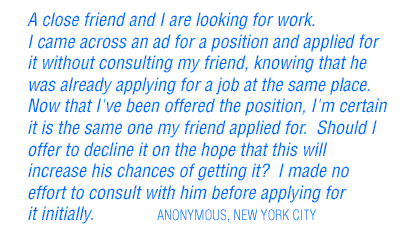

What’s the real story, Lil Miss Anonymous? Do you want to play ball or don’t you? Life’s a bitch, ain’t it? One minute, you’re lying flat on your ass eating Cheetos and faxing resumes, not getting a single interview. The next minute, bang, a job lands in your lap with all the gainful ardor of a chihuahua with a bladder problem.
Your altruism is commendable, if more than a little suspect in a capitalist republic that favors a ruthless dog-eat-dog mentality — to give you a specific analogy, it’s a bit like lapdogs and chihuhuas taking bites out of each other beneath a sneezeguard at a Vegas buffet with a broad culinary swath. First off, did your friend know about this specific ad? The great thing about the help wanted section is how some of these painfully cheery recruiters try to disguise their ads by giving you a private fax number for a specific venue (though tracking the telephonic prefixes and the general language used can easily keep you ahead of the game), or don’t give you any information at all (“Apply: Position #342”), or offer you very strange instructions on how to apply (“Please arrive on Wednesday at 9:30 a.m. Prepare for further application procedures. Bring dungarees.”).
My brother Randy mentioned Samuel Beckett when answering this question, and I have to say that, despite his complacency and attempts to be down with the liberal arts crowd, he’s onto something. If you feel the need to throw in the towel (because your friend will find out), keep in mind that the employment world is so hopelessly Byzantine that with any “Luke, I am your father” revelation to your friend, there’s probably a million variables you can fall back on.
After working for a radio show with a well-known host, I wrote an essay about it, without naming the host or show, although anybody who’d heard the show could have identified both. I did not vilify the host but characterized him with amused detachment. When I mentioned the essay to a friend who works for an organization associated with a show, he implied, without reading it, that publishing it would be wrong. Would it? A.B.S., NEW YORK.
When William Goldman wrote about his experiences (Adventures in the Screen Trade), he had no problem dishing the dirt. He characterized several stars and directors as utter buffoons — in a few cases, outright avaricious ones. You could make the case that Goldman was trying to sabotage his own career. He was, after all, around 51 when he wrote it. So a case could be made that the hostile chronicling arose from a mid-life crisis. But something very strange happened. The book became a bestseller and is often referenced in film classes. And Goldman still has a career, albeit writing crap like Dreamcatcher.
What do you really want to do, A.B.S.? That’s the real question here. Obviously, you have a hankering to publish this puppy (assuming it bears enough merit to be published). But why the hell are you writing to Randy? If you’re not prepared to make a hard decision between your job security and your desire to emulate Rex Reed, then I’d say that you need to put some more complications into your life. Publish it. Accept the consequences. Take a fucking risk for once, you chicken. The fact is, A.B.S., that you’re just too passive-minded for my time. So if you want me (or Randy) to make a decision for you, then I’d favor the harder choice. If only to get these silly journalistic urges out of your system and put a little hair on your chest.
Jesus, the radio business turns people into a bunch of wishy-washy bores, doesn’t it?